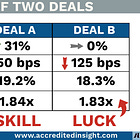Trust, but Verify (or How to Vet a Sponsor)
Good Sponsor, Bad Deal > Bad Sponsor, Good Deal
If you invest in private markets, everyone wants your capital, from a first-time real estate syndicator to BlackRock.
Increasingly, you don’t even need to meet the traditional accredited investor thresholds. Alternative asset managers are aggressively courting the “mass affluent,” and this is just the beginning.
For many sponsors, private investors represent the next frontier of untapped capital:

That raises a question:
How do you vet the people asking for your trust (and your money)?
Unlike public markets, private placements offer limited transparency and minimal regulatory oversight. As SEC Commissioner Hester Peirce put it:
“In private markets, information asymmetries are greater and investors must rely more heavily on their own due diligence.”
Institutional LPs have resources (ILPA, Preqin, PitchBook, etc), and entire teams dedicated to diligence. Retail investors? They’re on their own.
That’s why today’s article focuses on the most important part of private placement investing: due diligence on the sponsor.
We’ll walk through what to evaluate, what to ask, and what red flags to take seriously. Because a great sponsor managing a mediocre deal almost always safer than a great deal in the wrong hands.
This conversation would not be complete without a tangent on incentives:
Brief reminder before we jump in: this content is for informational purposes only and does not constitute legal, financial, or investment advice. Always do your own due diligence and consult with a qualified advisor before making investment decisions.
1. Track Record & Experience
I once had a call with a GP and casually mentioned a nearby deal being syndicated by another group. I asked if they’d bid on it. He said, “No, we didn’t. We own an asset two blocks away and know the area well. The neighborhood doesn’t support the assumptions you'd need to make the price work.”
That’s the kind of insight you only get from real experience.
✔️ What to look for:
Experience in this specific asset class and market. I know, I’ve said this before, but it’s worth repeating: a GP’s track record in the asset class (and the specific geography, if it’s CRE) is the most reliable indicator of future performance.
Deals of similar size, structure, and complexity. A 125,000 sf warehouse is a different beast from a 2,300 sf one, you get the idea. The fact that a sponsor has $2B AUM doesn’t mean they know what they are doing in any given market (just see this story).
Full-cycle performance history, ideally across different market conditions. This post has a great example of a track record that contains meaningful info:
🚩 Red flags:
A short operating history in any given asset class. I give more credit to GPs who’ve spent years in one vertical and then pivot, than to brand-new groups jumping straight into a new space.
No verifiable results or unwillingness to share past deal data.
Claims of success that don’t hold up to scrutiny. I’ve seen deals on GP track records that were technically joint ventures (where they had no control or decision-making authority). That’s not the same as running the deal.
📌 Ask for performance summaries of past deals and contact info for prior investors. Talk to those investors about communication, transparency, and how the sponsor handled adversity.
2. Team Depth & Capabilities
Look at each team member individually, and then look at how they work together. Sometimes 1 + 1 = 4, and sometimes 1 + 1 = 0.
With brand-new teams, it’s hard to know which way it’ll go.
✔️ What to look for:
Key personnel with relevant domain expertise (e.g., acquisitions, asset management, finance)
A cohesive team that’s worked together across deals
Reasonable staff-to-project ratio. Think whether any given team can scale effectively, while acquiring and managing assets, and raising capital.
🚩 Red flags:
Solo operators without real infrastructure.
High turnover or outsourcing of core functions.
“Jack of all trades” teams spread too thin.
📌 Interview senior team members, if possible. Confirm bios, employment histories, and credentials.
3. Financial Strength, Alignment and Skin in the Game
This one’s always up for debate. But if you understand how promote structures work, you’ll see why GPs have every incentive to contribute as little capital as possible.
That creates a serious misalignment. And yes, this is a hill I’m willing to die on.
✔️ What to look for:
Sponsor putting meaningful personal capital into the deal (here’s an interesting study from 2017 on the correlation of VC fund performance and GP’s capital commitment)
Compensation tied to long-term performance, not just AUM growth or front-end fees
Financial stability of the sponsor’s business (does the sponsor need to do deals to generate fee income?)
🚩 Red flags:
Heavy fees up front regardless of performance
Minimal skin in the game
Signs of liquidity stress or over-reliance on future fundraising. Pay special attention to this when evaluating private credit funds. ALWAYS calculate whether cash (not just accrued interest) is sufficient to cover distributions.
📌 Review financials if available. ALWAYS look at the fee structure and capital stack, especially where the sponsor sits relative to your tranche of equity.
4. Transparency & Governance
The reddest of red flags? A GP who refuses to share information or answer questions before you wire the money. In such cases, count your lucky stars and move on.
✔️ What to look for:
Clear, regular reporting
Defined communication cadence
Thoughtful approach to managing conflicts and investor rights
🚩 Red flags:
Vague reporting promises
Resistance to reasonable information requests
Unilateral decision-making authority with little accountability
📌 Request sample investor reports. Review the operating agreement to understand rights, governance structure, and conflict resolution processes.
5. Legal & Regulatory Standing
When the proverbial stuff hits the fan (and statistically, it will at some point), how people respond comes down to character. Some will do the right thing, even when they’re not legally required to. Others… won’t. Let’s leave it at that.
Last story of the day. I know an LP who ran a background check on two principals of a fund. A few things came up. Not major, but enough to raise eyebrows. I passed on the deal for a few reasons, including those findings. The investment ended up being a mess. Maybe it would’ve gone badly no matter what, but that experience taught me this: if something feels off during diligence, pay attention. Especially to the stuff that sits just on the edge.
✔️ What to look for:
Clean legal record
Proper registrations where applicable (always a good idea to spot check entity registration)
🚩 Red flags:
Prior lawsuits or SEC enforcement actions (I have a crazy story about this one, but that’s for another time)
Evasiveness around legal or compliance questions
📌 Run background checks. Use FINRA’s BrokerCheck, the SEC’s IAPD database, and public court records in the state the entity is registered, and in the state the principal office is located.
Putting It All Together
Document review: PPM, operating agreement, etc - look for consistency and clarity.
Background checks: go beyond Google (but for the love of all that’s good, please also do a basic Google search!!!) Use regulatory databases and litigation trackers.
Reference calls: ask for 3 references, and CALL THEM! Prior LPs will tell you how things went when deals didn’t go as planned.
Site visits: for real assets, visit properties or operating facilities, if you are in the area. If not, at a very minimum, do a Google drive.
Third-party input: bring in legal, tax, and operational experts to vet areas outside your lane. Network with other LPs, make friends, join some LP groups.
P.S. If you enjoyed this article, and know someone who will benefit from reading it, please share using the button below.






I loved the research article about VC GPs who put in more money had better returns.
“Network with other LPs, make friends, join some LP groups” - what are LP groups?